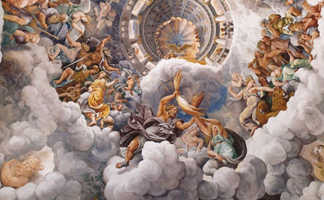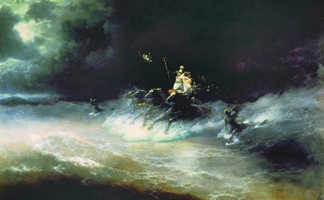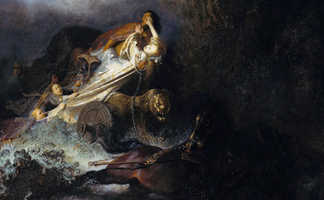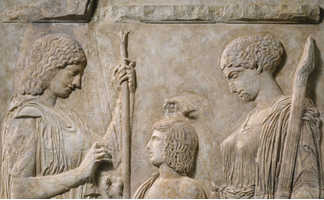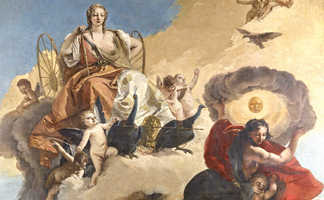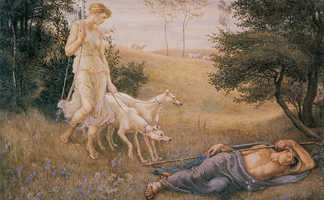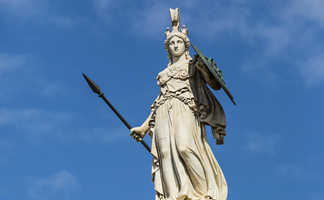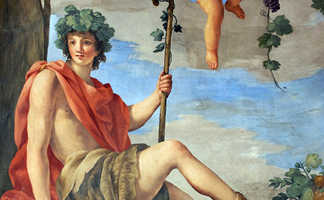Hermes is one of those multi-talented, multi-faceted deities that seem to be everywhere at once. Which is pretty logical, since speed is his chief modus operandi thanks to a pair of winged sandals and a winged helmet. He is considered the protector of human messengers, of travelers, of merchants, of public speakers, and, interestingly, of thieves.
(More on thievery in a bit.) He was the guide who conducted souls into the afterlife. He has associations with deities connected to growing things, and of nature (such as Pan, who was also his son, and the nymphs), and is considered a protector of livestock. He was known as well as the god who blessed people with luck. He was also considered the god of eloquence, which probably derives from his facile speech, an example of which you’ll see below in Homer’s Hymn to Hermes.
His role in the Odyssey was mainly that of messenger of the god and guide of the dead to Hades. His name is probably derived from the word herm, which meant “heap of stones,” and was used to denote boundaries, or to mark distances on roads. This original heap of stones evolved to sculpted boundary stones which were placed at strategic places around the ancient Athenian Agora, for example, to mark its boundaries. As you can see, the stones had an interesting configuration:
They were basically rectangular pillars with only the head and genitals of Hermes carved into it.
Hermes was the son of Zeus, and Maia, one of the Pleiades. The Pleiades were seven sisters, nymphs who were the companions of Artemis, goddess of the hunt.
Homeric Hymn To Hermes
The lengthy (6,500 words-plus) Homeric Hymn to Hermes, the fourth of Homer’s hymns to the gods, calls Hermes the “bringer of luck.” It tells the story of Zeus and Maia, who was a shy nymph, and how they had assignations in her cave home, far from the prying eyes of both gods and men. Homer says that the son she bore was “shifty, blandly cunning, a robber, a cattle driver, a bringer of dreams, a watcher by night, a thief at the gates.”
Shortly after birth, baby Hermes leaps out of the cradle, and goes off in the night to steal the cattle of Apollo. This act eventually won for Hermes a home in Olympus, at Zeus’ invitation, because Zeus was impressed with his initiative in stealing Apollo’s cattle at such a young age. “Young” is right, seeing as he was only one day old at the time. Most of Homer’s Hymn to Hermes revolves around this his theft of Apollo’s cattle, how he cleverly led them over sandy ground to obscure their tracks, and made them walk backwards to make it appear that the cattle were headed in the opposite direction.
At one point baby Hermes kindles a fire using wood and friction, and Homer mentions that he taught this art to men (Prometheus brought fire to men, but apparently did not teach them how to start a fire). After sacrificing two of the cattle and dividing them up into twelve portions, Hermes returns to his home on Mt. Cyllene in the Peloponnese, a mountain associated with him to this day, and crawls back into his cradle.
In the meantime, Apollo, off on a journey of his own to reclaim his lost property, questions an old man, who had witnessed the infant driving the cattle backwards. Apollo eventually finds Hermes’ and Maia’s cave on Mt. Celline in the Peloponnese. After a thorough search of the cave, Apollo confronts the infant in his cradle, accusing him of the theft of his cattle.
“I haven’t seen your cattle,” Hermes answers innocently. “I am but an infant, and only care to sleep, and nurse at my mother’s breast.” He goes on to explain that, being born only yesterday, his feet are too soft for the stony roads of Greece, and that he has neither seen his cows, nor any thief of cows, winding up his little speech with this gem: “whatever cows may be, for I know them only by hearsay.”
Amused by his audacity, Apollo, still angry all the same, names Hermes “the prince of thieves.” Apollo carries the infant to Olympus, where Zeus will judge between them.
“Here is a child,” Apollo announces, “a burgling robber, whom I found after a long journey in the hills of Cyllene: for my part I have never seen one so pert either among the gods or all men that catch folk unawares throughout the world.” He goes on to tell the story of Hermes’ thievery, then takes a seat.
Hermes then rises to defend himself, saying that he will speak the truth to his father, “…for I am truthful and cannot tell a lie.” He goes on to complain that Apollo has brought no witnesses, that he has threatened to have Hermes thrown into Tartarus (i.e., hell), and a lot of other complaints as he plays the innocent infant wronged by the mighty Apollo, and swears he will exact revenge upon him some day for his “pitiless inquisition.” “All the while,” Homer says, “he kept shooting sidelong glances and held his swaddling clothes upon his arm.” In other words, he is lying while playing the innocent, and everyone knows it.
Zeus bursts out laughing “to see his evil-plotting child,” and commands both Apollo and Hermes to “be of one mind and search for the cattle together,” with Hermes as the guide. Hermes obediently leads Apollo to the cave where he had hidden the cattle. When Apollo sees the two cowhides Hermes had stretched out upon a nearby cliff face after slaughtering them, he marvels that a newborn infant could exhibit such strength.
But he’s still angry, and binds the infant god, who promptly breaks his bonds, takes up a lyre, the first ever,that he had fashioned out of a tortoise shell, and, playing and singing sweetly, finally pacifies the angry god.
Eventually Apollo forgives the deceptive Hermes: “Slayer of oxen, trickster, busy one, comrade of the feast, this song of yours is worth fifty cows, and I believe that presently we shall settle our quarrel peacefully.” He promises to reward Hermes if Hermes will tell him the source of his skill. Hermes then gives Apollo his lyre, artfully avoids answering Apollo’s question, but flatters him so thoroughly that Apollo appoints him as the guardian of herds.
Thenceforth the two gods become friends. Hermes promises never to steal from Apollo again. Zeus also appoints Hermes as the guardian of trade and merchants. (The Latin version of Hermes is Mercury, a word whose root is “merx” and we get the words “merchant,” “merchandise,” and “commerce” from it.) His story is and altogether delightful tale from the pen of Homer, or more likely, traditionally ascribed to Homer, some 2,500 (or more) years ago.
Hermes’ persona evolved as a sort of counterpart to Apollo. He enjoyed music, as did Apollo, and he was credited as the inventor of the kithara, one of two types of lyres in Ancient Greece (see the story above about his turning a tortoise shell into a lyre). He is even sometimes credited as the inventor of music.
Signifiers
Some symbols and animals associated with Hermes include the rooster, the tortoise, the goat, different species of fish, winged sandals and helmet, and a staff around which are wound two snakes. As the patron of merchants, he is sometimes depicted as holding a purse, and was known for wearing a cloak of invisibility. In earlier forms (Archaic Greece) he is usually depicted as a man with a beard, dressed as a traveler, a herald, or a shepherd. In classical Greece, from the 5th century onward (Classical Greece), he was usually depicted as an athletic, beardless young man. His staff, which had two snakes intertwined along its length, derives historically from a symbol of Ningishzida, the Mesopotamian god of vegetation and the underworld, who also served as a mediator between gods and humans. His role as guide of the dead along the road to the underworld expanded over time to being generally the patron of roads, travel, and sailors, as well, as has been mentioned, of commerce.
During Classical Greece (510-323 BC), Hermes’ profile in Attica and Athens was elevated. He was a symbol of Athenian naval power after a naval victory over the Persians in 475 BC, five years after the naval battle of Salamis. He was associated with the rising Athenian empire, and of democracy and the merchants who contributed to the expansion of Athens’ power.
Additional Myths
Hermes was dispatched by Zeus to slay the hundred-eyed giant Argus Panoptes (“Panoptes” = “All-seeing”), who had been commissioned by jealous Hera to guard Io, one of Zeus’ many extramarital lovers, after Io had turned her into a cow.
Hermes aided the hero Perseus by, among other favors, lending him his winged sandals, helping Perseus to kill the gorgon Medusa (one of the three woman with snake hair who turned their victims into stone with a glance).
He provided Odysseus a magical herb to protect him from the spells of the witch Kirke.


